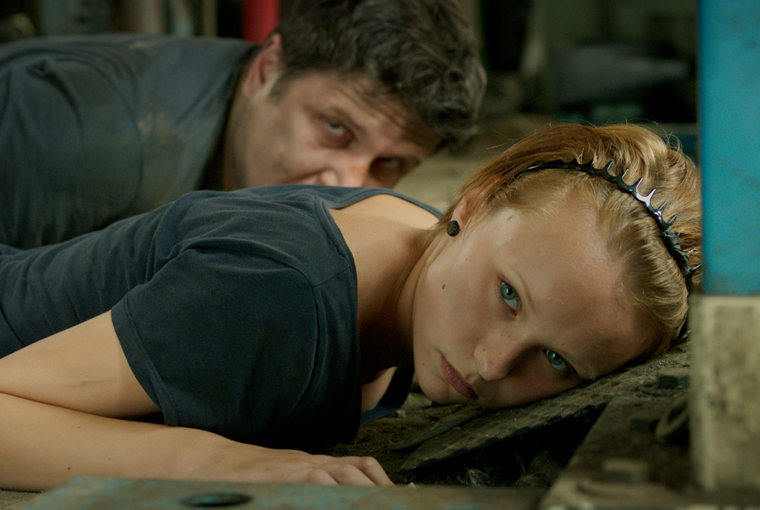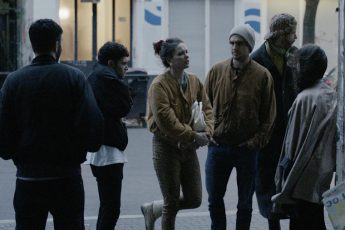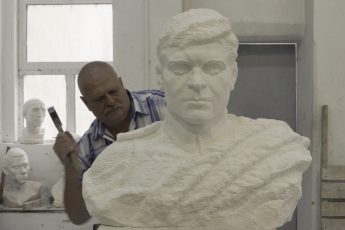Feminism? No, Thank You!
Svetla Tsotsorkova’s Sister (Sestra, 2019)
Vol. 100 (December 2019) by Lucian Tion
When I asked Svetla Tsotsorkova whether her film was about gender, she hesitated a little before answering straightforwardly: “About male-female relationships? Yes. About women? No!” There is a similar sense of honesty in Tsotsorkova’s rendering of her female protagonist in Sister, a film that focuses on two teenage girls eking out an existence together with their mother in a small Bulgarian town.
Of the sisters, it is the younger Rayna, played with obdurate nonchalance by the photogenic 18-year-old Monika Naydenova, who is the focus of the film. With her arresting screen persona, Rayna manages to become not only the center of the audience’s attention, but, because of her close-to-manic neediness, the center of the family drama about to unroll when she wedges herself in-between those she cares about in order to satisfy her craving for attention. On top of that list of loved ones is undoubtedly her sister Kamelia (Svetlana Yancheva) and the town mechanic (Assen Blatechki), with whom the latter has something of an affair. Rayna is envious of her elder sister’s amorous shenanigans with Milo, a vulgar man in his late 30s who doesn’t seem to care too much which of the two sisters he spends the night with. Despite her repugnance for him, Rayna is intrigued by Milo’s vulgarity, which leads her, in her rich imagination, to cook up a bogus relationship between her and her sister’s boyfriend. This is devastating for Kamelia, who threatens to leave home, even if her departure endangers the very existence of the family workshop, which represents their only source of income. The well-paced bickering between the sisters progressively grows to attract in its vortex the mysterious mother as well a small part of the local community with cathartic effects for all.
In our conversation Tsotsorkova admitted that the story is partly autobiographical and that Rayna’s character is based on herself, which explains why Monika’s cold and distant rendition of Rayna appears lifelike. The director further confessed to living in a small town herself and thinking up stories (or lies) to both pass time and cope with many of life’s challenges. When such a challenge showed itself in the guise of an entrance exam for the Film and Theater Academy in Sofia, Tsotsorkova didn’t hesitate to lie her way through, as she put it, that is, make up a story about her personal life that was so preposterous the exam committee didn’t have any trouble believing her. In the film, on the other hand, Rayna’s lies set in motion a machinery that threatens to reveal hidden truths, but also potentially destabilize the well-constituted family order.
This is indeed an appealing offer, and to question whether a teenager’s lies might have a good or nefarious effect on social life makes for excellent drama. However, it is not Rayna’s lying and the consequences of this behavior that I found most interesting in Tsotsorkova’s film. After all, if not altogether excusable, lying is at least understandable from the position Rayna finds herself in: her age and her impoverished surroundings, her ambition, and the boredom of small-town family life all help explain her attempt to change her prospects through any means at her disposal, even if this entails shaking the social order. Moreover, as audiences used to the social order of small-town Eastern Europe, we might actually enjoy the shake-up, as we do not find the portrayal of a post-Socialist town besieged by poverty and mired in stagnation, either particularly unprecedented or altogether desirable. We have seen enough recent Eastern European films to know that in this part of the world hospitals are understaffed and somewhat unprofessional; that inhabitants have little hope for the future; and that, overall, capitalism has turned reality into a nightmarish version of their erstwhile hopes for democracy. What is more interesting by far in Tsotsorkova’s film is the way in which the director plays with the audience.
By thwarting expectations in connection with her characters, the director ultimately debunks some myths about the much-aggrieved Eastern European post-Socialist landscape and, it goes without saying, the dramatis personae that populate it. As such, the doctor supposed to treat Milo after the latter receives a beating, turns out not to be the jerk we expected him to be, but a benevolent drunk (he even plays the guitar when he is alone in his house at night), while Milo turns out not to be a misogynist, even though his initial behavior would strongly encourage one to think so. It is very effective of Tsotsorkova to have Milo transform, when Rayna decides on a whim to spend the night at his place in her impassioned struggle to make her sister jealous, into a reasonably nice guy, and thus overturn the stereotype we might have formulated in our minds about his character. Indeed, showing his paternal side, Milo decides he does not want to take advantage of Rayna’s naiveté. All people have a soul, Tsotsorkova’s thinking seems to go, even in this psychologically and economically depressed backside of Eastern Europe; if only they were given a genuine chance to show it!
What pleases us is this almost iconoclastic aspect of the film. If we have been only too used to seeing these depressed Eastern European typologies dominate the screens of previous Bulgarian works like Tilt, Eastern Plays, Posoki, and Slava, it is refreshing to find out that clichés have an obverse, so to speak, and that not all is what it appears to be. And in this sense it is again Milo’s treatment that comes across as even-handed.
We might be right in assuming that Milo’s vulgarity, his big-mouthedness and overall cockiness are what ultimately got him a relatively cozy lifestyle (he owns his garage and doesn’t seem to be exactly lacking). But it is also the above qualities that get him into trouble with a group of local Roma. So the question we ask is: could a similar violent treatment have actually caused Milo’s present cockiness? It is not only that what goes up must come down, but that every filmic and typological effect has its cause. If Tsotsorkova doesn’t exactly excuse androcentric behavior, she seems to hint that all evils in this world have their causes, and it would behoove us to investigate facts before crying foul. Milo’s character (even if played a bit too “un-roughly” by Bulgaria’s well-loved theater actor Assen Blatechki) is an invitation to look beyond the clichés that Eastern European screens have made famous in the past decades, and to question the reasons that have led to the construction of these clichés.
What else does the film adduce in the landscape of new Bulgarian cinema, made famous now by the films mentioned above? I talked to Svetla Tsotsorkova about the film’s theme, and what came up was the insistent focus (and her own preoccupation) with what she calls the “little people,” or that segment of the population left behind by the brutal transition to a market economy that Bulgaria experienced in the last 30 years. The director admits that this is a concern shared by many contemporary Bulgarian directors, but also by the late generation of directors working under Socialism. (Here Svetla enthusiastically listed the Czech New Wave among her influences.) Given the current socially-conscious “movement” that characterizes Bulgarian cinema from Slava to Sister, Tsotsorkova’s intent is to continue this cinematic trend. In Sister she succeeds for the most part, even if the sometimes over-polished look threatens to make the film lose touch with the rough reality she wants to portray. However, the relative freshness of her angle on human relationships, and the fact that Tsotsorkova refrains from promoting Sister as yet another tendentious female disempowerment drama, make her second film the harbinger of relative novelty in Bulgarian cinema, novelty we can only hope will concretize in an even bolder film in the future.




Leave a Comment